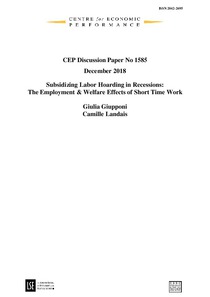Subsidizing labor hoarding in recessions: the employment & welfare effects of short time work
"The Great Recession has seen a revival of interest in policies encouraging labor hoarding by firms. Short time work (STW) policies, which consist in offering subsidies for hours reductions to workers in firms experiencing temporary shocks, are the most emblematic of these policies, and have be...
| Main Authors: | , |
|---|---|
| Institution: | ETUI-European Trade Union Institute |
| Format: | TEXT |
| Language: | English |
| Published: |
London
2018
LSE |
| Subjects: | |
| Online Access: | https://www.labourline.org/KENTIKA-19306216124911244989-Subsidizing-labor-hoarding-in-.htm |
| Summary: | "The Great Recession has seen a revival of interest in policies encouraging labor hoarding by firms. Short time work (STW) policies, which consist in offering subsidies for hours reductions to workers in firms experiencing temporary shocks, are the most emblematic of these policies, and have been used aggressively during the recession. Yet, very little is known about their employment and welfare consequences. This paper leverages unique administrative social security data from Italy and quasi-experimental variation in STW policy rules to offer compelling evidence of the effects of STW on firms' and workers' outcomes, and on reallocation in the labor market. Our results show large and significant negative effects of STW treatment on hours, but large and positive effects on headcount employment. Results also show that employment effects disappear when the program stops, and that STW offers no long term insurance to workers. Finally, we identify the presence of significant negative reallocation effects of STW on employment growth of untreated firms in the same local labor market. We develop a simple conceptual framework to rationalize this empirical evidence, from which we derive a general formula for the optimal STW subsidy that clarifies the welfare trade-offs of STW policies. Calibrating the model to our empirical evidence, we conduct counterfactual policy analysis and show that STW stabilized employment during the Great Recession in Italy, and brought (small) positive welfare gains. " |
|---|---|
| Physical Description: | 81 p. Digital |

